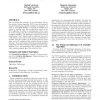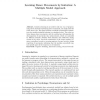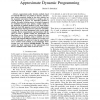207 search results - page 15 / 42 » Learning Multi-modal Control Programs |
129
click to vote
GECCO
2006
Springer
15 years 5 months ago
2006
Springer
The conversion and extension of the Incremental ParetoCoevolution Archive algorithm (IPCA) into the domain of Genetic Programming classifier evolution is presented. In order to ac...
116
click to vote
ECCV
2006
Springer
16 years 4 months ago
2006
Springer
Non-negative tensor factorization (NTF) has recently been proposed as sparse and efficient image representation (Welling and Weber, Patt. Rec. Let., 2001). Until now, sparsity of t...
127
click to vote
KI
2008
Springer
15 years 2 months ago
2008
Springer
Abstract. Imitation learning is an intuitive and easy way of programming robots. Instead of specifying motor commands, you simply show the robot what to do. This paper presents a m...
126
Voted
CDC
2010
IEEE
14 years 9 months ago
2010
IEEE
Approximate policy iteration methods based on temporal differences are popular in practice, and have been tested extensively, dating to the early nineties, but the associated conve...
103
click to vote
PUC
2006
15 years 2 months ago
2006
Traditional remote controls typically allow users to activate functionality of a single device. Given that users activate a subset of functionality across devices to accomplish a p...



